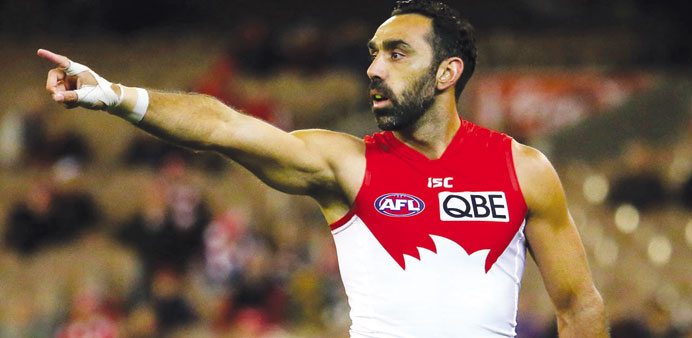Adam Goodes, a veteran of over 300 games for Australian Football League (AFL) team Sydney Swans, has been hit with a volley of boos from the crowd in recent weeks.
Reuters/Melbourne
Having a thick skin is a handy attribute for top Australian Rules footballers, but incessant jeering of one of the game’s greatest Aboriginal players has become an embarrassing distraction for the country’s richest sporting competition.
Adam Goodes, a veteran of over 300 games for Australian Football League (AFL) team Sydney Swans, was awarded the prestigious “Australian of the Year” title in 2014 for his leading role in the fight against racism on and off the sporting field.
Yet in recent weeks, whenever he touches the ball, in whatever corner of the country, the 35-year-old forward is hit with a volley of boos from the crowd.
Like passionate football fans across the globe, Australians can be unforgiving in the terraces and more than willing to share their frustrations with players that offend.
But the booing of Goodes has alarmed anti-racism advocates and shone the spotlight on race relations in Australia.
A prominent and outspoken community leader, Goodes has been forthright in discussing race in a country where indigenous people lag behind the mainstream in human development indicators including infant mortality and life expectancy.
He has challenged Australians’ image of themselves as a tolerant people and demanded recognition of Aboriginals and Torres Strait Islanders in tahe country’s governing Constitution.
His strident advocacy has put sections of the public off-side, according to Dr Tim Soutphommasane, Race Discrimination Commissioner in the Australian Human Rights Commission (AHRC), a government agency.
“It’s disappointing to see Adam Goodes standing being booed and jeered in such a way,” Soutphommasane said yesterday. “There’s no doubt in my mind it’s because of his advocacy for indigenous issues and his stance against racism.”
Goodes, an ambassador for the Commission’s ‘Racism. It Stops Now’ campaign, has now declined to discuss the booing, hoping it will die off if starved of attention.
“If we keep acknowledging it week in week out, then people will keep doing it,” Goodes told state radio last week. “For me, I’ve got to go out there and play my role.”
Teammates, opposition players and AFL officials have urged the booing to stop, but it fell on deaf ears on Saturday at Melbourne’s Docklands Stadium where Goodes and the Swans played the North Melbourne Kangaroos.
Other Aboriginal players play their football unharassed but Goodes has become a lightning rod for criticism from conservative pundits since a racially-charged incident involving a 13-year-old spectator in 2013.
In the opening match of the AFL’s annual ‘Indigenous Round’ that year, Goodes was called an ‘ape’ by a teenage girl, a fan of the opposing Collingwood Magpies. He stopped play to alert security staff, who ejected her from the stadium.
“Racism has a face. It’s a 13-year-old girl,” he remarked at the time.
The Collingwood president apologised on behalf of his club but days later he was to apologise again after joking on Melbourne radio that the producers of ‘King Kong’, a touring musical, should use the footballer to promote their show.
Goodes was both applauded and lambasted for the public take-down of the teenage girl, but the criticism seemed to “intensify” when he was named Australian of the Year, Soutphommasane said.
Amid the harsh reception of recent weeks, Goodes has remained defiant. Two weeks ago, during this season’s ‘Indigenous Round’, he celebrated kicking a goal with a ‘war-dance’ he learned from indigenous children in a junior football side.
The celebration was defended by AFL chief Gillon McLachlan, but some pundits decried it as inflammatory. Critics on social media have claimed their booing has little to do with racism and more to do with the way he plays.
They have claimed Goodes ‘stages’—or tries to con umpires into giving him free kicks by feigning illegal contact from opponents.
The argument rings hollow given other players branded ‘stagers’ are not subjected to relentless jeering.
The AFL has been damning of it but declined to comment on whether it is racially charged.
“There’s not much to be achieved for us to be discussing the reasons as to why it happens,” AFL spokesman Patrick Keane told Reuters.
The controversy has soured the league’s 20th anniversary of its ground-breaking establishment of a racial vilification code in 1995, then a first among major sporting competitions in Australia.
Once prevalent, racism on the field is now rarely heard of in top-flight Australian Rules.
Stamping out racism off the field may prove a longer battle.
“It’s hard but we have seen a lot of progress in just the space of a few years,” Soutphommasane said.
“In the past two years we’ve heard and seen many examples of spectators reporting incidents of racial abuse and insult.”

